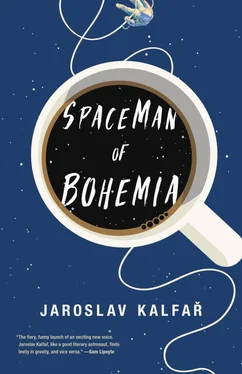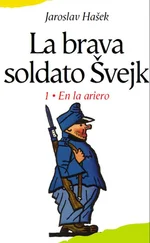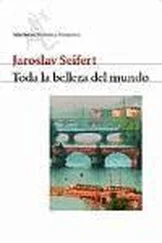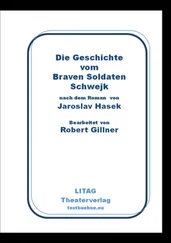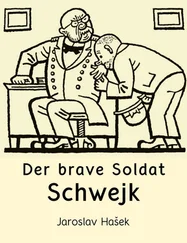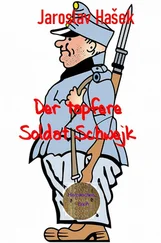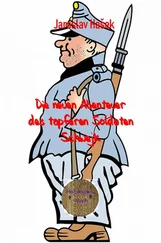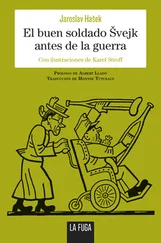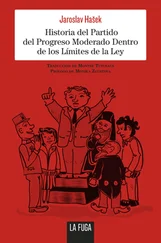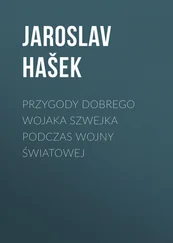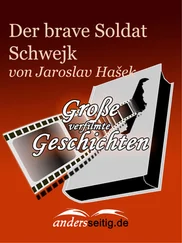We leave Šíma in another village with our cousin Alois. He is too wild for the city, too fond of chasing little creatures and swimming in the river. It would not be fair to make him suffer the concrete and the noise of endless city cars. My grandmother and I cry for him as we ride the train from Alois’s back to Středa. Šíma .
Throughout moving day, I clutch my copy of Robinson Crusoe . The marks of mice teeth pock the cover and the smell of mold clings to it, but the hard spine holds as strong as the gates of a fortress. After we are all loaded up, Grandpa insists on painting the gate before we leave. The movers, a couple of lanky Kazakhs with rum on their breath, smoke cigarettes and sigh with annoyance. I try to help, but he asks to do it alone. He has to break every few minutes because of the back pain, the strain in his deltoids and forearms. When we finally drive off, the gate is the color of fresh wooden logs that Grandpa and I would fetch from the forest during early spring, wood well-fed by morning rains and rich soil, wood that we’d have to leave out in the sun for months before it began to dry and lose its will to live. We leave the gate brown and solid for its new fate.
The apartment we have rented on Pařížská belonged to a Party official until 1989. After that, the new owner converted the entire floor into a French restaurant that went bankrupt within a year. Then a German entrepreneur bought the floor and split it into five apartments in the style of the New West, resulting in a plainness that makes it feel nothing like home. The sink is small and flimsy, the walls thin, the toilet seat plastic. Whenever a neighbor above us flushes, we hear the echo within the pipes. This is what we can afford on my grandparents’ retirement, an apartment I would never bring a friend to, had I any left. There is no history here, no legacy—everything we now own or rent seems to be made of plastic or tin in a factory for a few coins paid to immigrant laborers. Even if Shoe Man was serious about sending money, I know that Grandpa would rather burn it and get a job in construction, if it comes down to it.
But all of this lies ahead. On the way to Prague I know nothing about the apartment, and as Grandpa follows the moving truck, I spend my time in the backseat of the borrowed Škoda, deciding that I must be the biological carrier of my father’s curse. It must rest within my bowels like a tapeworm. I am determined never to disappoint my grandparents, never to misbehave, for their lives will now be confined within the tight space of a city without soil because of something that is inherently a part of me. We drive over the cube bricks of Prague’s Old Town, braking every few minutes for stray tourists standing in the middle of the road to take pictures of Gothic towers, old Jewish quarters, cemetery gates. The bakery where my father used to get rakvičky, or caskets—small pastries with tiramisu filling topped with whipped cream and chocolate shavings—is now a Kentucky Fried Chicken, and I yearn for a juicy thigh I could dip into mashed potatoes and gravy, but I have no right to make demands. I am the curse, and we don’t have the money for Western takeout. Dinner will be potatoes and sour cream, the same dish that sustained my grandparents’ families through the second war. We drive past the shopping malls and multiplexes rising from the ruins of old community centers, the places where Prague youths once gathered to watch educational films about doing their part for the Soviets and played football in red T-shirts. I don’t recognize this city—its new, well-dressed explorers, its taxicabs and Tommy Hilfiger billboards. I don’t know this free Prague, but I’d like to. So many luxuries are now within reach, and I cannot afford any of them.
Just as we park in front of the building and Grandpa instructs the movers, Elvis’s “Jailhouse Rock” comes on the radio. I reach over and switch to a different station. Grandma doesn’t say a word. The sound of flutes, bassoons, and a harp. The soprano of a woman calling for something, reminding me of an owl seeking the return of sound waves through the middle of a black night. I ask Grandma what this is, and she smiles.
“Rusalka,” she says. “It’s an opera.”
“Have you seen it?” I ask.
“It was your mother’s favorite. She and I saw it together soon after she married your father.”
“Are you angry with him? For all of this.”
The station’s signal vanishes, and the song morphs into static. Grandma ignores it and looks directly ahead. The static reminds me of a toothache. Finally, Grandma turns down the volume, gathers her things, and speaks upwards, as if making a declaration to a crowd, via microphone.
“No,” she says, sounding just like my grandfather.
THE CIGAR BOX was made of solid cedar and weighed exactly two kilograms and thirty grams. For the past few nights, after Hanuš and I finished our conversation and he nestled in his usual corner, just outside my sleeping chamber, I had removed it from the storage chest and run my hands over its matte yellow cover hailing Partagas—Hecho en Cuba . I would slide the cover off and pull out the silk pouch holding the ashes of my grandfather. I allowed the pouch to float around the cabin for a while, like a mother guiding her child on a first swim.
I couldn’t help but think of my grandfather’s actual body and how it would fare in Space, his short legs, stout enough to support a belly holding sixty full years of enthusiasm for brew, his thick arms tattooed with a blue jay and a fading cowboy, his bullish face covered with gray stubble and his thin hair permanently plagued with dandruff, all of this mass suspended in the air and calmly measuring the universe outside, occasionally wheezing and roaring with smoker’s cough and asking for a Marlboro to soothe it. I knew he would’ve liked the peace and quiet of Space to read the newspaper and write in his journals, but his hands would crave livestock and gardening in the midst of all the idleness, the waiting. No, I supposed, my grandfather would not have the patience for stargazing and matter expansion. He was not a man who could stare into darkness and wonder. Yet, I had brought him with me, hoping at last to discover his final resting place after having held on to the box containing his ashes for years. Every day, after breakfast and again before sleep, I wished to put the box into the dispenser and shoot it out into the cosmos. Every day, I could not bring myself to do it. Today was the day. Venus was so close now it made up the majority of the panorama. Within hours, I would make contact with cloud Chopra.
I returned to the Lounge, where Hanuš witnessed the approaching dust storm through the observation window. Over the past few hours, the patterns photographed by JanHus1’ s lenses had been analyzed by Central, and Petr’s team had concluded that the cloud’s seemingly calm demeanor was a disguise for a storm raging within its borders, as if the thicker core held gravitational powers causing the dust to swirl around it, like a cyclone. The concerns about my safety were unspoken but clear on Petr’s face during our video calls.
Hanuš’s legs hung loosely beneath him. He was all shadow against the explosions of light ahead. A thick cloud of purple tainted the map of dying stars in front of us, like a swarm of buzzards raiding a can of paint. Over the course of my mission, the cloud had shrunk to half its original size, but it had not moved an inch, establishing a baffling relationship with Venus’s gravitational influence. I was so close now I could see the movement of its particles, snowflakes inside a freshly shaken globe. The swarming dust was phosphorescent, glowing around the edges and darkening until reaching the purple core, a mass so thick I could not see through it. The speed of the particles as measured by photographic analysis was deemed safe enough for entry. The excitement for the mission that I had lost now loomed around the edges of my mind again. Whatever Hanuš was, he wasn’t mine to possess, not even mine to understand. His presence was soothing, but his existence incomprehensible. The cloud ahead, however—behaving in a way we’d never seen a phenomenon of its kind behave, measurable, unable to run—was mine to own. The cloud ahead could be put under a microscope. It could be understood.
Читать дальше
